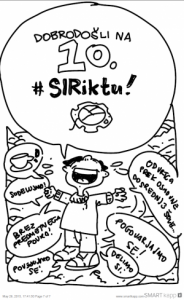Mojca Kruh, Osnovna šola Šentjernej, Podružnična osnovna šola Orehovica, Orehovica
In modern times there is less and less singing in the home environment and families that sing together have become rare. This is why the choir at our school is very important – it nurtures, encourages and preserves singing. Singing has an important influence on the childs well-being and development. It makes children relax, become creative, develop their vocal and musical competence, it trains their musical memory and last but not least helps them learn how to breathe correctly, which is the basis of correct and healthy speech. The choir is a special social environment. It offers the individual the space to be successful, without being individually exposed and at the same time offers the opportunity to feel well and fell »group power«. There is no greater pleasure among the singers when, after working hard in rehearsals, they get a big round of applause at their performance. A special kind of energy can be felt among them. I have been leading the choir and Orff club at Orehovica branch school for several years. 30 pupils (from grade 1 to 5), which is almost half of all the students, participate in both activities. Together, we make sure that work is done well in the choir and the Orff club by learning from each other via ICT. At rehearsal, we tune in with the help of recordings of pupils performing breathing and tuning exercises. The exercises are recorded with pupils of various ages. Similarly, older students record the melody and singing for a new song. We all learn together following the recording. We often perform at the school and in the town. All performances are recorded and then reviewed at rehearsals. This helps us with our future work. We analyse the performers demeanour, body language, facial expressions, singing etc. in the recordings. The choir and Orff club interact and complement each other. The Orff club uses the Sibelius 5 computer programme to write simple song accompaniments, which are performed by Orff instruments. This type of work enables pupils to be much more concentrated, efficient, motivated and prepared for rehearsals. The work is dynamic and thought through, all the students can be actively included. This type of learning has no spatial or time limitations. It does not end with the school year, but is built on and reinforced year after year.
